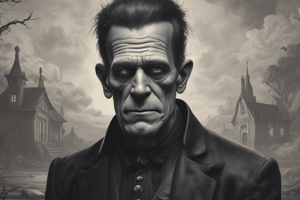Podcast
Questions and Answers
Why does Victor not announce the real murderer nor confess to the crimes himself?
Why does Victor not announce the real murderer nor confess to the crimes himself?
Because he created the monster who murdered William. He didn't confess because he was in Ingolstadt on the night of the murder.
How does the evidence against Justine build?
How does the evidence against Justine build?
The prosecutor brings forth witnesses to prove that she was out the entire night when the murder was committed, seen near the body, gave a confused answer when questioned, became hysterical upon seeing the body, and had William's miniature in her pocket.
How accurate is Justine's assertion that she has no enemy on earth?
How accurate is Justine's assertion that she has no enemy on earth?
Justine's assertion is incorrect; she believes she has no enemies, but her character and behavior did not protect her from being wrongly accused.
How does Elizabeth defend Justine?
How does Elizabeth defend Justine?
Why does Victor claim that he is suffering more than the accused?
Why does Victor claim that he is suffering more than the accused?
Do you believe Justine would have been convicted of William's murder if she had not confessed?
Do you believe Justine would have been convicted of William's murder if she had not confessed?
Why does Justine confess to William's murder?
Why does Justine confess to William's murder?
Do you agree with Victor's decision to keep his suspicions regarding William's murder to himself?
Do you agree with Victor's decision to keep his suspicions regarding William's murder to himself?
List some examples of how Justine may have received an unfair trial.
List some examples of how Justine may have received an unfair trial.
Flashcards
Victor's Silence
Victor's Silence
Victor remains silent about his monster's role in William's murder.
Evidence Against Justine
Evidence Against Justine
Circumstantial evidence points to Justine as William's murderer.
Justine's Trust
Justine's Trust
Justine naively believes her kindness protects her from harm.
Elizabeth's Defense
Elizabeth's Defense
Signup and view all the flashcards
Victor's Guilt
Victor's Guilt
Signup and view all the flashcards
Justine's Conviction
Justine's Conviction
Signup and view all the flashcards
Justine's Confession
Justine's Confession
Signup and view all the flashcards
Victor's Ethical Dilemma
Victor's Ethical Dilemma
Signup and view all the flashcards
Flaws in Justine's Trial
Flaws in Justine's Trial
Signup and view all the flashcards
Study Notes
Victor's Silence on the Murderer
- Victor remains silent about the true murderer due to his creation of the monster who killed William.
- He could not confess as he was not present at the murder scene during the crime.
Evidence Against Justine
- Prosecutors present multiple pieces of evidence to build a case against Justine:
- Justine was out the night of the murder.
- She was seen near William's body.
- Her confused responses raised suspicion during questioning.
- Her hysterical reaction upon seeing the body contributed to the prosecution's argument.
- William's miniature was discovered in her dress pocket, linking her to the crime.
Justine's Misplaced Trust
- Justine's assertion of having no enemies is ultimately flawed.
- She naively believes her virtuous character will protect her and cannot comprehend the existence of someone who would harm her without reason.
Elizabeth’s Defense of Justine
- Elizabeth passionately defends Justine, describing her maternal relationship with William.
- She emphasizes Justine's positive character and the affection she received from the Frankenstein family.
Victor's Guilt
- Victor claims his suffering surpasses that of the accused, driven by guilt for creating the monster responsible for two murders: William and Justine.
Potential Conviction of Justine
- Justine's conviction was likely inevitable given the overwhelming circumstantial evidence against her, outweighing her defense.
Justine's Confession
- Justine confessed to the murder, driven by fear of eternal damnation and the desire for absolution, feeling coerced into admitting guilt.
Victor's Ethical Dilemma
- Victor's choice to withhold his knowledge of the true murderer is ethically questionable.
- His silence directly contributes to the wrongful execution of an innocent person.
Flaws in Justine's Trial
- Justine's trial exemplifies systemic flaws in the legal process:
- She was presumed guilty and had to provide proof of innocence.
- She was denied legal representation.
- Conviction was based on circumstantial evidence rather than solid proof.
- Coercive tactics during her confinement led to her false confession.
Studying That Suits You
Use AI to generate personalized quizzes and flashcards to suit your learning preferences.




